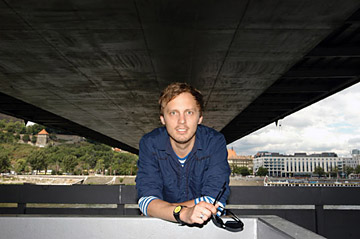We regret the passing, on April 11, 2024, of the distinguished Romanian author and critic Dan Cristea, who served as the editor in chief of the Luceafărul de Dimineață cultural monthly. In addition to being an alum of the 1985 Fall Residency, Cristea received his PhD in Comparative Literature at the University of Iowa.

Michal Hvorecký (IWP 04) was born 1976 in Czechoslovakia, and lives now in Slovakia. He has published six books of fiction, which have been translated into four languages; his plays have been performed in Prague, Hannover, Vienna and in his hometown Bratislava. You can find him on Facebook or www.hvorecky.com
IWP: What or whom do you read to recharge your writerly batteries?
MH: Graphic novels, pulp magazines and very very serious German fiction.
IWP: What personal characteristic do you care most about in your life as a writer?
MH: Sitzfleisch [A German term best translated by the (unverified) coinage of Frank Conroy, one of the directors of Iowa Writers’ Workshop, as “ass-in-chair.”]
IWP: No matter what IWP organizes, writers seem to take away impressions of Iowa City that defy prediction. Is there something about your stay in the US that has remained particularly memorable?
MH: It changed my life for good. I am not kidding.
IWP: Is there particular music that complements or stimulates your writing?
MH: In 2000 I created the Wilsonic Music Festival in Bratislava, together with my dear friend, DJ and promoter Tibor Holoda. I listen to the music of the artists we invite there every year. From Koop over Gus Gus to Apparat or Fennesz.
IWP: What are you working on right now?
MH: On a new novel called Danube in America. It will be a book about my two years as a tour manager and interpreter on river cruises for American tourists in Central Europe - crazy encounters indeed!
IWP: What are the effects of the many digital and web-based literary activities in your region/language/literary circuits? Are you interested in, or affected by, these changes in the texture of language and modes of writing?
MH: This shift was the topic of my short stories from the very beginning. Most of the publicity for my books is on the internet and in the new social networks. My Facebook community of friends and fans gets my news, videos, audio files and event invitations on regular basis.
IWP: What writers, or what works, are in your opinion in need of more translation and attention? What literary neighborhood excites you at the present moment?
MH: I belong to the Slovak language and literature, both of which are more or less unknown in the world. It takes a lot of self-irony to deal with this situation. At almost every reading in Germany and Austria I expect to be explaining that I don’t come from Slovenia, or Slovania or any other place starting with an S. As a reader I am a big fan of writing from Central Europe.
IWP: From your vantage point, should the state be involved in supporting literary creativity or literary institutions, and if so, in what ways?
MH: Yes, and fortunately in Slovakia the State really is, though only on a small scale, and one that shrinks further every year... The Ministry of Culture provides, for instance, a subsidy for translations of Slovak fiction as well as non-fiction into foreign languages. This is the case for Irish and Finnish literatures as well, otherwise there would be little chance to get any international recognition at all. Unfortunately, in my part of the world--mdash;the former Eastern Bloc behind the former Iron Curtain--mdash;the institutions responsible for this funding are often corrupted by various bureaucratic politicians-poets, who do love to support, but only themselves.
IWP: What--mdash;if anything--mdash; has given you a cause for political optimism in the last decade?
MH: Ten years ago Slovakia was the underdog of Europe, underestimated by the European Union and the neighboring states. Today my country has the second fastest growing economy on the old continent, little unemployment and decently paid jobs. My countrymen live better lives and also buy more books. Just a decade ago the book market was almost dead. The identity of the people is also changing radically, which has a way of inspiring a writer.
Find Us Online